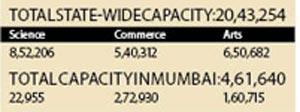Registrations for admissions across state start, but slow responses by colleges threatens to derail the process. This year marks a significant shift, with the Maharashtra government mandating a 100 per cent online FYJC admission process across the entire state, expanding it from earlier years.

From today, students can start listing their preferred colleges online as per schedule announced by the state government. Representation Pic/iStock
Student registrations for First Year Junior College (FYJC) admissions are set to begin on May 19, officially launching the Std XI admission season across Maharashtra. However, a slow response from colleges threatens to derail the schedule of what is being touted as the state’s first fully digital admission process.
Despite the timely declaration of Std X and XII results, on May 13 and May 5, respectively, the centralised online admission system is seeing a tepid response from junior colleges so far. As of Friday night, only 9482 junior colleges and schools had completed their registration on the official portal, a number education experts say is lower than last year’s.
This year marks a significant shift, with the Maharashtra government mandating a 100 per cent online FYJC admission process across the entire state, expanding it from earlier years when only select districts participated in the centralised system. The move aims to simplify the procedure and increase accessibility, but officials admit the logistical challenges are immense.
 From today, students will be able to start listing their preferred colleges online. Representation Pic/iStock
From today, students will be able to start listing their preferred colleges online. Representation Pic/iStock
“We are working around the clock to verify and onboard institutions, but with so many colleges yet to complete registration, delays in the admission timeline appear likely. Still, student registrations will begin from Monday, May 19,” a senior official from the school education department told mid-day.
From Monday, students will be able to start registering and listing their preferred colleges online as per the schedule announced by the state government. But incomplete college data and pending verifications have raised doubts over whether subsequent admission rounds can stay on schedule.
Parents, too, are grappling with the uncertainties. Madhura Karve, a parent from Thane, voiced her concerns about the inter-city preference system. “We are open to sending our daughter to Pune, where we have family and relatives. But there’s no clarity on how preferences across cities will be prioritised or processed,” she said.
College administrators, especially from rural areas, are also wary of the implications of a centralised system. A principal from Raigad district, speaking on the condition of anonymity, questioned whether smaller institutions would be marginalised. “Urban colleges will likely fill up fast. We’re unsure if students rejected by those colleges will even consider listing ours as a backup.”
Hi-tech push
As the state navigates its ambitious push for a fully digital FYJC admission system, all eyes will be on the coming week. With student registrations kicking off, both clarity and swift action from the Directorate of School Education will be key to preventing disruptions in the academic calendar. Since it will be a centralised process, each candidate will have to give a minimum of one and a maximum of 10 preferences for colleges where they seek admission. Previously, students had to physically visit colleges to submit application forms, leading to a time-consuming and often inconsistent process.
To ensure transparency and uniformity, the school education department has issued formal guidelines via a government resolution. These guidelines were released even before the official announcement of the Secondary School Certificate (SSC) results, given that this is the first time FYJC admissions will be conducted completely online across Maharashtra.
“This will be a fully digital admission process, and it will make it more convenient, reliable, and accessible for both students and parents,” said a senior official from the school education department.
However, officials also acknowledge that implementation and data accuracy will be key to its success.
Vacant seats
The shift to a centralised online system also comes amid growing concerns over large-scale seat vacancies in FYJC colleges, especially in the Mumbai Metropolitan Region. In the 2024 admission cycle, 1.34 lakh seats (32.94 per cent) remained vacant across 1050 junior colleges in MMR, despite 12 rounds of admissions, including regular, special, and daily merit rounds. Out of 408,435 seats, only 273,898 students were admitted, with 26,495 remaining in the “not admitted” category,y even though 300,393 had registered. This recurring trend has prompted educational activists and academics to call for a comprehensive audit of the admission process. Many have also questioned the rationale behind granting permissions for new colleges and courses each year, despite the mounting number of unfilled seats.
9482
No. of junior colleges and schools in state that have completed registration on official portal as of May 16
Important dates
May 19 to May 20: A practice session for students will be held from 11 am to 6 pm. This is only for practice and data will be deleted by midnight
of May 20.
May 21 to May 28: The actual registration and preference filling will take place from 11 am to 6 pm
May 30: The provisional merit list will be announced at 11 am
May 30 to June 1: The grievances and correction process (via login) will take place until 4 pm
June 3: Merit list will be declared at 4 pm
June 5: Admission allocation based on merit list (zero round)
June 6: Allotted colleges will be displayed on portal at 10 am
June 6 to 12: Admissions to be opened from 11 am to 6 pm
. ‘Proceed for admission’ selection
. Document upload and verification
. Must take admission if allotted
June 14: 10 pm display of vacancy list for second round
Key features of FYJC admission process
. Four regular rounds of centralised admissions
. A final ‘Open Admission for All’ round to fill remaining vacant seats
. No offline admissions allowed, including management or manual quotas
. Admission decisions will be based strictly on merit
. Classes at junior colleges will begin after the first four rounds are completed
. The entire process will be supervised by the divisional deputy directors of education, who will issue instructions to schools and colleges
Important instructions
. Once admitted via CAP or quota to a college, admission is considered finalised
. Admission fee payment is accepted only via digital mode
. Strict adherence to the schedule is mandatory
. Management/in-house/minority quota admissions start from June 6

 Subscribe today by clicking the link and stay updated with the latest news!" Click here!
Subscribe today by clicking the link and stay updated with the latest news!" Click here!










